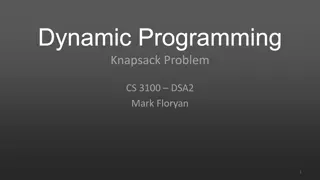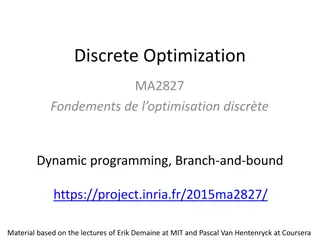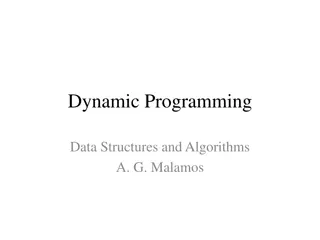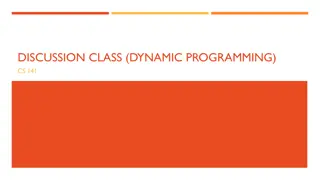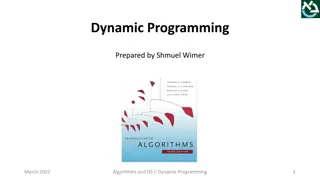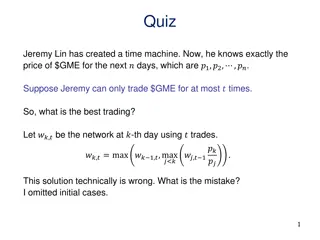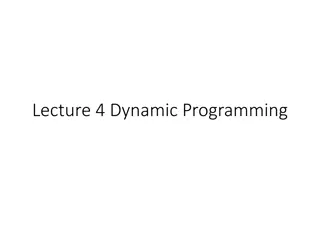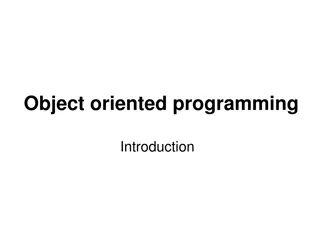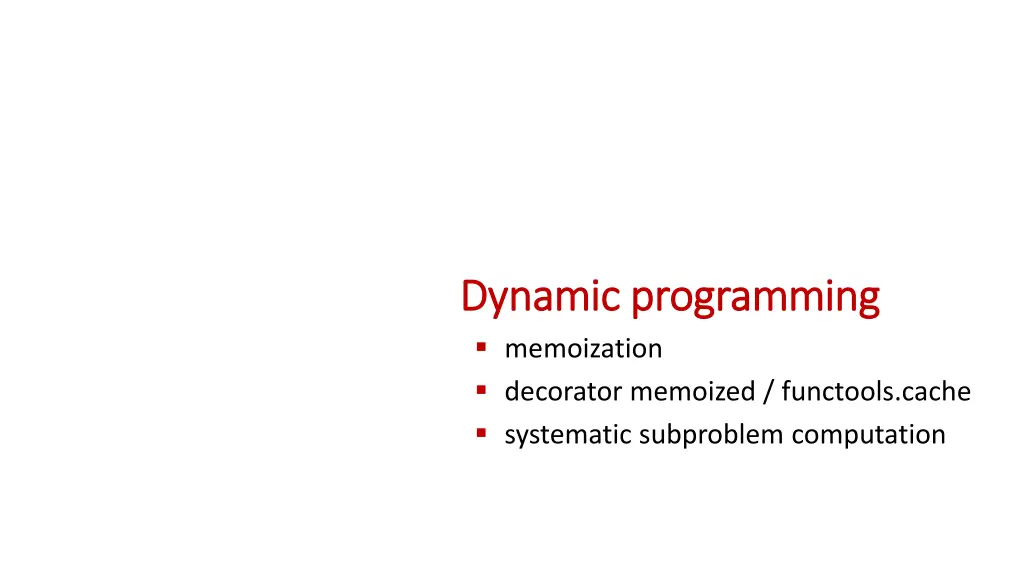
Dynamic Programming Techniques: Memoization, Recursion, and Binomial Coefficient Calculation
Explore dynamic programming concepts like memoization, recursion, and binomial coefficient calculation. Understand how these techniques can optimize computations and solve complex problems efficiently. Learn to implement them in Python for systematic subproblem computation.
Download Presentation

Please find below an Image/Link to download the presentation.
The content on the website is provided AS IS for your information and personal use only. It may not be sold, licensed, or shared on other websites without obtaining consent from the author. If you encounter any issues during the download, it is possible that the publisher has removed the file from their server.
You are allowed to download the files provided on this website for personal or commercial use, subject to the condition that they are used lawfully. All files are the property of their respective owners.
The content on the website is provided AS IS for your information and personal use only. It may not be sold, licensed, or shared on other websites without obtaining consent from the author.
E N D
Presentation Transcript
Dynamic Dynamic programming programming memoization decorator memoized / functools.cache systematic subproblem computation
--(7, 5) |--(6, 5) | |--(5, 5) | --(5, 4) | |--(4, 4) | --(4, 3) | |--(3, 3) | --(3, 2) | |--(2, 2) | --(2, 1) | |--(1, 1) | --(1, 0) --(6, 4) |--(5, 4) | |--(4, 4) | --(4, 3) | |--(3, 3) | --(3, 2) | |--(2, 2) | --(2, 1) | |--(1, 1) | --(1, 0) --(5, 3) |--(4, 3) | |--(3, 3) | --(3, 2) | |--(2, 2) | --(2, 1) | |--(1, 1) | --(1, 0) --(4, 2) |--(3, 2) | |--(2, 2) | --(2, 1) | |--(1, 1) | --(1, 0) --(3, 1) Binomial Binomial coefficient coefficient identical computations 1 +n 1 k 1 if k = 0 or k = n n k n 1 k = otherwise binomial_recursive.py def binomial(n, k): if k == 0 or k == n: return 1 return binomial(n - 1, k) + binomial(n - 1, k - 1) |--(2, 1) | |--(1, 1) | --(1, 0) --(2, 0) recursion tree for binomial(7,5)
Dynamic Programming Dynamic Programming Remember Remember solutions solutions already ( (memoization memoization) ) already found found Technique sometimes applicable when running time otherwise becomes exponential Only applicable if stuff to be remembered is manageable
Binomial Binomial Coefficient Coefficient programming using Dynamic Dynamic programming using a a dictionary dictionary recursion tree for binomial(7,5) --(7, 5) |--(6, 5) | |--(5, 5) | --(5, 4) | |--(4, 4) | --(4, 3) | |--(3, 3) | --(3, 2) | |--(2, 2) | --(2, 1) | |--(1, 1) | --(1, 0) --(6, 4) |--(5, 4) --(5, 3) |--(4, 3) --(4, 2) |--(3, 2) --(3, 1) binomial_dictionary.py answers = {} # answers[(n, k)] = binomial(n, k) def binomial(n, k): if (n, k) not in answers: if k == 0 or k == n: answer = 1 else: answer = binomial(n - 1, k) + binomial(n - 1, k - 1) answers[(n, k)] = answer return answers[(n, k)] Python shell > binomial(6, 3) | 20 > answers | {(3, 3): 1, (2, 2): 1, (1, 1): 1, (1, 0): 1, (2, 1): 2, (3, 2): 3, (4, 3): 4, (2, 0): 1, (3, 1): 3, (4, 2): 6, (5, 3): 10, (3, 0): 1, (4, 1): 4, (5, 2): 10, (6, 3): 20} Use a dictionary answers to store already computed values |--(2, 1) --(2, 0) reuse value stored in dictionary answers
Question Question What answers after What is the after calling binomial(n, k) ? ? is the order order of the of the size size of the of the dictionary dictionary binomial_dictionary.py answers = {} # answers[(n, k)] = binomial(n, k) def binomial(n, k): if (n, k) not in answers: if k == 0 or k == n: answer = 1 else: answer = binomial(n - 1, k) + binomial(n - 1, k - 1) answers[(n, k)] = answer return answers[(n, k)] a) max(n, k) b) n + k c) n * k d) nk e) kn f) Don t know
Binomial Binomial Coefficient Coefficient Dynamic Dynamic programming programming using using decorator decorator Use a decorator (@memoize) that implements the functionality of remembering the results of previous function calls binomial_decorator.py def memoize(f): # answers[args] = f(*args) answers = {} def wrapper(*args): if args not in answers: answers[args] = f(*args) return answers[args] return wrapper @memoize def binomial(n, k): if k == 0 or k == n: return 1 else: return binomial(n - 1, k) + binomial(n - 1, k - 1) www.python-course.eu/python3_memoization.php
binomial_decorator_trace.py Python shell (without @memoize) Python shell (with @memoize) binomial(5, 2) | binomial(4, 2) | | binomial(3, 2) | | | binomial(2, 2) | | | > 1 | | | binomial(2, 1) | | | | binomial(1, 1) | | | | > 1 | | | | binomial(1, 0) | | | | > 1 | | | > 2 | | > 3 | | binomial(3, 1) | | | binomial(2, 1) | | | | binomial(1, 1) | | | | > 1 | | | | binomial(1, 0) | | | | > 1 | | | > 2 | | | binomial(2, 0) | | | > 1 | | > 3 | > 6 | binomial(4, 1) | | binomial(3, 1) | | | binomial(2, 1) | | | | binomial(1, 1) | | | | > 1 | | | | binomial(1, 0) | | | | > 1 | | | > 2 | | | binomial(2, 0) | | | > 1 | | > 3 | | binomial(3, 0) | | > 1 | > 4 > 10 10 binomial_memoize(5, 2) | binomial_memoize(4, 2) | | binomial_memoize(3, 2) | | | binomial_memoize(2, 2) | | | > 1 | | | binomial_memoize(2, 1) | | | | binomial_memoize(1, 1) | | | | > 1 | | | | binomial_memoize(1, 0) | | | | > 1 | | | > 2 | | > 3 | | binomial_memoize(3, 1) | | | binomial_memoize(2, 1) | | | > 2 | | | binomial_memoize(2, 0) | | | > 1 | | > 3 | > 6 | binomial_memoize(4, 1) | | binomial_memoize(3, 1) | | > 3 | | binomial_memoize(3, 0) | | > 1 | > 4 > 10 10 without assigning wrapper.__name__ the name shown would be wrapper def trace(f): # decorator to trace recursive calls indent = 0 def wrapper(*args): nonlocal indent spaces = '| ' * indent arg_str = ', '.join(map(repr, args)) print(spaces + f'{f.__name__}({arg_str})') indent += 1 result = f(*args) indent -= 1 print(spaces + f'> {result}') return result return wrapper def memoize(f): answers = {} def wrapper(*args): if args not in answers: answers[args] = f(*args) return answers[args] wrapper.__name__ = f.__name__ + '_memoize' return wrapper @trace @memoize def binomial(n, k): if k == 0 or k == n: return 1 return binomial(n - 1, k) + binomial(n-1, k-1) saved recursive calls when using memoization print(binomial(5, 2))
Dynamic Dynamic programming programming using using cache cache decorator decorator bionomial_cache.py from functools import cache @cache def binomial(n, k): if k == 0 or k == n: return 1 else: return binomial(n - 1, k) + binomial(n - 1, k - 1) The decorators @cache (since Python 3.9) and @lru_cache(maxsize=None) in the standard library functools supports the same as the decorator @memoize By default @lru_cache at most remembers (caches) 128 previous function calls, always evicting Least Recently Used entries from its dictionary docs.python.org/3/library/functools.html#functools.lru_cache
Subset Subset sum sum using using dynamic dynamic programming programming In the subset sum problem (Exercise 13.4) we are given a number x and a list of numbers L, and want to determine if a subset of L has sum x L = [3, 7, 2, 11, 13, 4, 8] x = 22 = 7 + 11 + 4 Let S(v, k) denote if it is possible to achieve value v with a subset of L[:k], i.e. S(v, k) = True if and only if a subset of the first k values in L has sum v S(v, k) can be computed from the recurrence True False if k = 0 and v = 0 if k = 0 and v 0 otherwise S(v, k) = S v, k 1 or S(v L k 1 , k 1)
Subset Subset sum sum using using dynamic dynamic programming programming subset_sum_dp.py def subset_sum(x, L): @memoize def solve(value, k): if k == 0: return value == 0 return solve(value, k - 1) or solve(value - L[k - 1], k - 1) return solve(x, len(L)) Python shell > subset_sum(11, [2, 3, 8, 11, -1]) | True > subset_sum(6, [2, 3, 8, 11, -1]) | False
Question Question What memoization memoization table What is a table if all is a bound bound on the if all values values are on the size are possitive possitive integers size order order of the of the integers? ? a) len(L) b) sum(L) c) x d) 2len(L) e) len(L) f) len(L)*sum(L) g) Don t know subset_sum_dp.py def subset_sum(x, L): @memoize def solve(value, k): if k == 0: return value == 0 return solve(value, k-1) or solve(value - L[k-1], k-1) return solve(x, len(L)) Python shell > subset_sum(11, [2, 3, 8, 11, -1]) | True > subset_sum(6, [2, 3, 8, 11, -1]) | False
Subset Subset sum sum using using dynamic dynamic programming programming subset_sum_dp.py def subset_sum_solution(x, L): @memoize def solve(value, k): if k == 0: if value == 0: Python shell > subset_sum_solution(11, [2, 3, 8, 11, -1]) | [3, 8] > subset_sum_solution(6, [2, 3, 8, 11, -1]) | None return [] else: return None solution = solve(value, k - 1) if solution != None: return solution solution = solve(value - L[k - 1], k - 1) if solution != None: return solution + [L[k - 1]] return None return solve(x, len(L))
Volume Value Knapsack Knapsack problem problem 3 6 0 3 7 1 Given a knapsack with volume capacity C, and set of objects with different volumes and value Objective: Find a subset of the objects that fits in the knapsack (sum of volume capacity) and has maximal value Example: If C = 5 and the volume and weights are given by the table, then the maximal value 15 can be achieved by the 2nd and 3rd object Let V(c, k) denote the maximum value achievable by a subset of the first k objects within capacity c 2 8 2 5 9 3 0 if k = 0 V(c, k 1) volume[k 1] > c otherwise V(c, k) = max{V c, k 1 , value k 1+ V(c volume k 1 , k 1)}
Knapsack Knapsack maximum maximum value value knapsack.py def knapsack_value(volume, value, capacity): @memoize def solve(c, k): # solve with capacity c and objects 0..k-1 if k == 0: # no objects to put in knapsack return 0 v = solve(c, k - 1) # try without object k-1 if volume[k - 1] <= c: # try also with object k-1 if space v = max(v, value[k - 1] + solve(c - volume[k - 1], k - 1)) return v return solve(capacity, len(volume)) Python shell > volumes = [3, 3, 2, 5] > values = [6, 7, 8, 9] > knapsack_value(volumes, values, 5) | 15
Knapsack Knapsack maximum maximum value value and and objects objects knapsack.py def knapsack(volume, value, capacity): @memoize def solve(c, k): # solve with capacity c and objects 0..k-1 if k == 0: # no objects to put in knapsack return 0, [] v, solution = solve(c, k - 1) # try without object k-1 if volume[k - 1] <= c: # try also with object k-1 if space v2, sol2 = solve(c - volume[k - 1], k - 1) v2 = v2 + value[k - 1] if v2 > v: v = v2 solution = sol2 + [k - 1] return v, solution return solve(capacity, len(volume)) Python shell > volumes = [3, 3, 2, 5] > values = [6, 7, 8, 9] > knapsack(volumes, values, 5) | (15, [1, 2])
Knapsack Knapsack - - Table Table 0 if k = 0 V(c, k 1) value[k 1] > c otherwise V(c, k) = max{V c, k 1 , value k 1+ V(c volume k 1 , k 1)} capacity volume[k-1] c 0 0 skip include object k-1 object k-1 systematic fill out table only need to remember two rows k-1 k V(c, k) len(volume) final answer
Knapsack Knapsack Systematic Systematic table table fill fill out out knapsack_systematic.py base case k = 0 1 def knapsack(volume, value, capacity): solutions = [(0, [])] * (capacity + 1) for obj in range(len(volume)): for c in reversed(range(volume[obj], capacity + 1)): prev_v, prev_solution = solutions[c - volume[obj]] v = value[obj] + prev_v if solutions[c][0] < v: solutions[c] = v, prev_solution + [obj] 3 1 2 consider each object 2 5 4 solutions[c:] current row solutions[:c] previous row 3 compute next row right-to-left 4 solutions[:volume[obj]] unchanged from previous row return solutions[capacity] 5 Python shell > volumes = [3, 3, 2, 5] > values = [6, 7, 8, 9] > knapsack(volumes, values, 5) | (15, [1, 2])
Summary Summary Dynamic programming is a general approach for recursive problems where one tries to avoid recomputing the same expresions repeatedly Solution 1: Memoization add dictionary to function to remember previous results decorate with a @memoize decorator Solution 2: Systematic table fill out can need to compute more values than when using memoization can discard results not needed any longer (reduced memory usage)
Coding competitions and online judges Coding competitions and online judges If you like to practice your coding skills, there are many online judges with numerous exercises and where you can upload and test your solutions. Project Euler Kattis Google Code Jam CodeForces Topcoder See cs.au.dk/~gerth/code/
Google Code Jam Google Code Jam codingcompetitions.withgoogle.com/ codingcompetitions.withgoogle.com/codejam codejam Coding competition Qualification round 2022 (April 2, 01:00 April 3, 04:00) In 2021 there was 37.000 participants for the qualification round Scoreboard 2017
Google Code Jam Google Code Jam - - Qualification Round 2017 Qualification Round 2017 Problem A: Oversized Pancake Flipper ( Problem A: Oversized Pancake Flipper (description description) ) N pancakes each with exactly one happy chocolate side K-flipper that can flip K consecutive pancakes Problem: Find minimim number of flips to make all pancakes happy, if possible Before Flipped After






